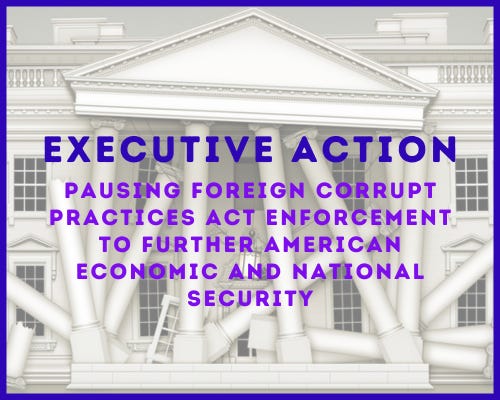Pausing Foreign Corrupt Practices Act Enforcement to Further American Economic and National Security
Analysis of Trump’s Executive Order
Overview:
This executive order directs the Department of Justice (DOJ) to suspend enforcement of the Foreign Corrupt Practices Act (FCPA) for 180 days, with a possible extension. The administration argues that current FCPA enforcement places U.S. companies at a competitive disadvantage, hampers foreign policy goals, and limits economic growth. The order also mandates a review of FCPA enforcement policies to align them more closely with U.S. national security and economic interests. While supporters claim this move removes unnecessary regulatory burdens, critics warn it will weaken global anti-corruption efforts, damage U.S. business credibility, and invite increased unethical practices.
Detailed Analysis:
Suspension of FCPA Investigations and Enforcement:
Policy: Temporarily halts all new FCPA investigations and prosecutions while ongoing cases are reviewed for potential dismissal or reconsideration.
Progressive Concern:
Erosion of Anti-Corruption Standards: Suspending enforcement sends a signal that bribery and unethical business practices will not be penalized, potentially increasing corruption among U.S. firms abroad.
Weakened Global Leadership: The U.S. has been a leader in international anti-corruption efforts; this move could embolden corrupt actors and erode international trust in American businesses.
Potential for Increased Fraud and Abuse: Without accountability, businesses may engage in unethical dealings that could create legal and financial risks for shareholders and consumers.
Justification Based on Economic Competitiveness:
Policy: The administration argues that strict FCPA enforcement disadvantages American firms by restricting their ability to compete in markets where bribery is common.
Progressive Concern:
Short-Term Gain, Long-Term Consequences: While some companies may benefit from relaxed enforcement in the short term, the long-term effect could be loss of credibility and increased legal exposure in other jurisdictions that still enforce anti-corruption laws.
Damage to Corporate Reputation: U.S. companies known for ethical business practices have a competitive advantage. If corruption becomes more widespread, American firms may lose trust with international partners.
Encouraging a Race to the Bottom: Weakening anti-corruption measures may encourage global competitors to follow suit, leading to an overall decline in business integrity and governance standards.
Mandated Review of FCPA Enforcement Guidelines:
Policy: Orders the Attorney General to review and revise current enforcement guidelines to ensure they align with U.S. economic and foreign policy objectives.
Progressive Concern:
Politicization of Anti-Corruption Efforts: Adjusting FCPA enforcement to prioritize economic and diplomatic interests risks making prosecution decisions more about political convenience than justice.
Lack of Transparency: The review process may be conducted behind closed doors, potentially leading to weakened enforcement policies that favor corporate interests over accountability.
Chilling Effect on Whistleblowers: Employees who might otherwise report corruption may fear that their claims will no longer be taken seriously, reducing overall corporate accountability.
Historical Context:
Enactment of the FCPA (1977): Passed to curb corporate bribery of foreign officials following high-profile corruption scandals in the 1970s.
Global Anti-Corruption Leadership: The U.S. has played a key role in international agreements like the OECD Anti-Bribery Convention, setting the standard for ethical business practices worldwide.
Notable FCPA Cases: Major corporations, including Siemens, Walmart, and Goldman Sachs, have faced significant penalties for violating the FCPA, demonstrating the law’s effectiveness in curbing corporate corruption.
Trump Administration’s Past Criticism of the FCPA: During his first term, Trump publicly criticized the FCPA, calling it a “horrible law” that made it difficult for U.S. businesses to operate abroad.
Broader Implications:
Weakened Corporate Accountability: Without strong enforcement, corporations may engage in unethical practices that hurt workers, consumers, and global markets.
Risk of Retaliatory Sanctions: Other countries that enforce anti-corruption laws, like the UK and EU nations, may impose penalties on U.S. firms that engage in bribery.
Increased Risk of Corruption in U.S. Domestic Markets: A government that tolerates bribery abroad may face increased domestic corporate misconduct, further undermining public trust.
Social Media Posts:
Post 1: Pausing FCPA enforcement weakens global anti-corruption efforts and puts U.S. businesses at legal risk abroad. Ethical business practices are a competitive advantage. Read more: https://www.whitehouse.gov/presidential-actions/2025/02/pausing-foreign-corrupt-practices-act-enforcement-to-further-american-economic-and-national-security/#BusinessEthics #AntiCorruption #CorporateIntegrity
Post 2: The U.S. should lead in fighting corruption, not give corporations a free pass. This FCPA rollback only benefits bad actors while hurting long-term business credibility. #GlobalStandards #IntegrityMatters #FCPA
Post 3: When the U.S. weakens anti-bribery laws, it encourages corruption worldwide. We need more accountability, not less. #StopCorruption #EthicalLeadership #ProtectOurEconomy



